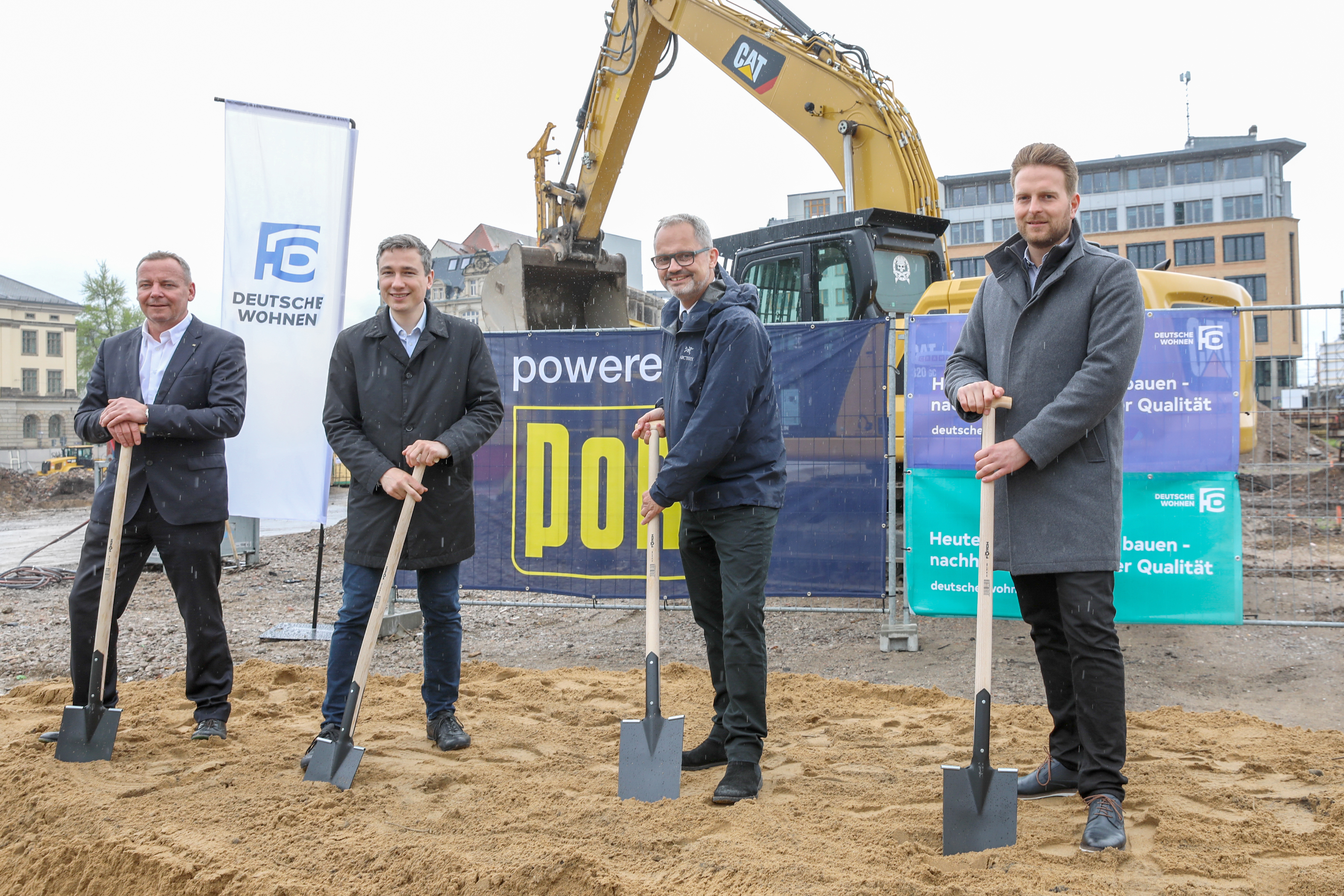First cut of the spade Deutsche Wohnen starts construction of the new Schützengarten residential area in Dresden
Together with Stephan Kühn, mayor of Dresden and cabinet member with responsibility for urban development and transport, Deutsche Wohnen marked the start of construction work on its new-build project Schützengarten with a symbolic first cut of the spade. Over the next three years, a residential area with 479 flats, green spaces, a children’s play area and a neighbourhood park will be built not far from the historic centre of the city. The first tenants are expected to move in in spring 2024.

Stephan Kühn, cabinet member for urban development, construction, transport and real estate in the state capital Dresden: “The Schützengarten is located in the heart of the historic centre of Dresden between Kraftwerk Mitte (the former power station which is now home to the State Operetta Dresden and the youth theatre, theater junge generation) and the Dresden College of Music. The Dresden Zwinger, the Semper Opera and the Heinz Steyer Stadium are all just 10 to 15 minutes’ walk away. The site has good transport links as it is very close to the S-Bahn station Dresden Mitte and a tram stop as well. This makes city living possible, with individual mobility options that do not require a car. Such a location places an obligation on the developers, particularly with regard to Dresden’s architecture. And Deutsche Wohnen SE has fulfilled these expectations. The company conducted a workshop procedure with several architects in order to obtain the best design possible. The Berlin-based firm of architects Nöfer came first in this competition. No less important is the fact that a total of 21 subsidised flats are being built for households ranging in size from single persons to four persons. This is an important message because a third of tenant households in Dresden can no longer afford rents on the open market.”
Henrik Thomsen, Chief Development Officer (CDO) of Deutsche Wohnen SE: “We are delighted to be making a visible contribution with our housing project to the further development and urban design of Dresden. For us, the world-famous architecture of the city is a source of both motivation and guidance. We would like to create for all the people of Dresden and, above all, for the future tenants a residential estate of high aesthetic and architectural quality – one that is integrated into their city.”
In the new development, which is aligned with the historical structure of the city and is located between Könneritzstraße, Jahnstraße and Laurinstraße, Deutsche Wohnen will construct 23 residential buildings with a total of 479 flats – of which more than a quarter are barrier-free – and will also create space for commercial traders on an area of around 2,200 m2. In what will be called the gatehouse, there will be around 80 barrier-free and, in part, wheelchair-accessible flats for assisted living. All the buildings are designed as a perimeter block development around three greened interior courtyards. The project will also provide three basement garages with around 900 bicycle and 190 car parking spaces, including electric charging posts.
Focus on sustainable neighbourhood development
Deutsche Wohnen attaches particular importance to sustainability both in planning and construction. To save resources and energy, for example, concrete from the site that has previously been broken up into small pieces is being reused for the building trenches and the roads in the estate. Furthermore, the entire project will be accompanied by the German Sustainable Building Council and certified upon completion.
Today’s official start of construction marks an important milestone for the new-build project Schützengarten, whose name refers to the original use of the area well into the 19th century. Since as far back as 2018, Deutsche Wohnen has carried out extensive preparatory building work on the site of the former East German power company, VEB Energiebau Radebeul. The demolition of the previous high-rise office blocks, bunker facilities and pre-war buildings has now been completed.
With its commitment to new builds in cities, Deutsche Wohnen is responding to the high demand for housing. Together with its strategic partner QUARTERBACK Immobilien AG, it will build around 18,000 flats over the coming years, particularly in the metropolitan regions of Berlin, Dresden/Leipzig, Munich and Stuttgart. Approximately 9,000 of these flats are earmarked for Deutsche Wohnen’s portfolio and represent a total investment volume of EUR 4.3 billion. In addition to the new-build project Schützengarten, a further 300 flats are currently being built in the two projects Johann Quarter in Dürerstraße and Annen Quarter in Clara-Zetkin-Straße. Since 2013, Deutsche Wohnen has managed a total of 6,000 flats and 280 commercial units in Dresden.
Deutsche Wohnen
Deutsche Wohnen is one of the leading publicly listed residential property companies in Europe. The business focus of the company is on managing its own portfolio of residential properties in dynamic metropolitan regions and conurbations in Germany. Deutsche Wohnen sees itself as having both a social responsibility and a duty to maintain and newly develop good-quality and affordable housing in vibrant residential neighbourhoods. As at 31 March 2021, the portfolio comprised a total of around 154,600 residential and 2,900 commercial units. Deutsche Wohnen SE is listed in the Deutsche Börse’s DAX and is also included in the leading indices EPRA/NAREIT, STOXX Europe 600, GPR 250 and DAX 50 ESG.